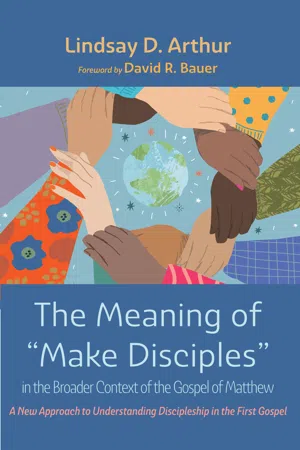
The Meaning of "Make Disciples" in the Broader Context of the Gospel of Matthew
A New Approach to Understanding Discipleship in the First Gospel
- 256 pages
- English
- ePUB (mobile friendly)
- Available on iOS & Android
The Meaning of "Make Disciples" in the Broader Context of the Gospel of Matthew
A New Approach to Understanding Discipleship in the First Gospel
About This Book
Students of the Bible are generally comfortable with their understanding of the command "make disciples" (Matt 28: 19). Indeed, most of them would argue that the Gospel writer, Matthew, spells out very clearly the meaning of the term in the Great Commission (Matt 28: 16-20) by utilizing three key words, viz., "go[ing], " "baptizing, " and "teaching." This point of view is the result of centuries of scholarly opinion that has looked primarily, if not solely, to these three adjacent participles of "make disciples" (Matt 28: 19), and not to the entire Gospel of Matthew, for the meaning of the command. This book does not suggest that "going, " "baptizing, " and "teaching" are not to be considered in determining the essence of Christian disciple-making. Rather, it contends that the three terms should not be our only source of meaning. This problem is tackled herein by demonstrating that Matthew establishes a framework within the Great Commission itself that points to a fuller meaning of "make disciples" in the broader context of his Gospel, and that the Gospel writer expects his reader to draw on his entire Gospel to grasp the full meaning of this important command.
Frequently asked questions
Information
Introduction
Table of contents
- Title Page
- Foreword
- Abbreviations
- Chapter 1: Introduction
- Chapter 2: Survey of Literature
- Chapter 3: Inductive Study of Matthew 28:16–20
- Chapter 4: Inductive Study of Other Matthean Passages
- Chapter 5: Matthean Discipleship in the New Testament Canon
- Chapter 6: Conclusion and Implications
- Appendix
- Bibliography